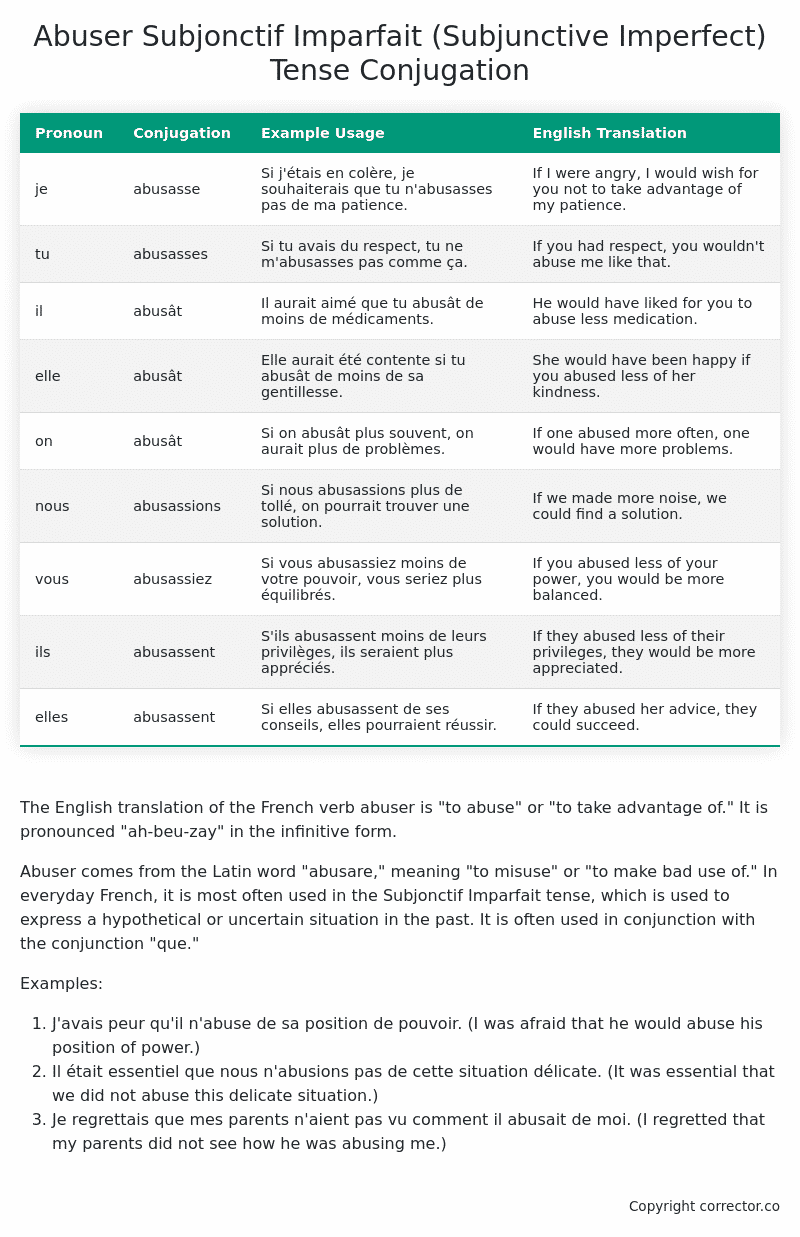Subjonctif Imparfait (Subjunctive Imperfect) Tense Conjugation of the French Verb abuser
Introduction to the verb abuser
The English translation of the French verb abuser is “to abuse” or “to take advantage of.” It is pronounced “ah-beu-zay” in the infinitive form.
Abuser comes from the Latin word “abusare,” meaning “to misuse” or “to make bad use of.” In everyday French, it is most often used in the Subjonctif Imparfait tense, which is used to express a hypothetical or uncertain situation in the past. It is often used in conjunction with the conjunction “que.”
Examples:
- J’avais peur qu’il n’abuse de sa position de pouvoir. (I was afraid that he would abuse his position of power.)
- Il était essentiel que nous n’abusions pas de cette situation délicate. (It was essential that we did not abuse this delicate situation.)
- Je regrettais que mes parents n’aient pas vu comment il abusait de moi. (I regretted that my parents did not see how he was abusing me.)
Table of the Subjonctif Imparfait (Subjunctive Imperfect) Tense Conjugation of abuser
| Pronoun | Conjugation | Example Usage | English Translation |
|---|---|---|---|
| je | abusasse | Si j’étais en colère, je souhaiterais que tu n’abusasses pas de ma patience. | If I were angry, I would wish for you not to take advantage of my patience. |
| tu | abusasses | Si tu avais du respect, tu ne m’abusasses pas comme ça. | If you had respect, you wouldn’t abuse me like that. |
| il | abusât | Il aurait aimé que tu abusât de moins de médicaments. | He would have liked for you to abuse less medication. |
| elle | abusât | Elle aurait été contente si tu abusât de moins de sa gentillesse. | She would have been happy if you abused less of her kindness. |
| on | abusât | Si on abusât plus souvent, on aurait plus de problèmes. | If one abused more often, one would have more problems. |
| nous | abusassions | Si nous abusassions plus de tollé, on pourrait trouver une solution. | If we made more noise, we could find a solution. |
| vous | abusassiez | Si vous abusassiez moins de votre pouvoir, vous seriez plus équilibrés. | If you abused less of your power, you would be more balanced. |
| ils | abusassent | S’ils abusassent moins de leurs privilèges, ils seraient plus appréciés. | If they abused less of their privileges, they would be more appreciated. |
| elles | abusassent | Si elles abusassent de ses conseils, elles pourraient réussir. | If they abused her advice, they could succeed. |
Other Conjugations for Abuser.
Le Present (Present Tense) Conjugation of the French Verb abuser
Imparfait (Imperfect) Tense Conjugation of the French Verb abuser
Passé Simple (Simple Past) Tense Conjugation of the French Verb abuser
Passé Composé (Present Perfect) Tense Conjugation of the French Verb abuser
Futur Simple (Simple Future) Tense Conjugation of the French Verb abuser
Futur Proche (Near Future) Tense Conjugation of the French Verb abuser
Plus-que-parfait (Pluperfect) Tense Conjugation of the French Verb abuser
Passé Antérieur (Past Anterior) Tense Conjugation of the French Verb abuser
Futur Antérieur (Future Anterior) Tense Conjugation of the French Verb abuser
Subjonctif Présent (Subjunctive Present) Tense Conjugation of the French Verb abuser
Subjonctif Passé (Subjunctive Past) Tense Conjugation of the French Verb abuser
Subjonctif Imparfait (Subjunctive Imperfect) Tense Conjugation of the French Verb abuser (this article)
Subjonctif Plus-que-parfait (Subjunctive Pluperfect) Tense Conjugation of the French Verb abuser
Conditionnel Présent (Conditional Present) Tense Conjugation of the French Verb abuser
Conditionnel Passé (Conditional Past) Tense Conjugation of the French Verb abuser
L’impératif Présent (Imperative Present) Tense Conjugation of the French Verb abuser
L’infinitif Présent (Infinitive Present) Tense Conjugation of the French Verb abuser
Struggling with French verbs or the language in general? Why not use our free French Grammar Checker – no registration required!
Get a FREE Download Study Sheet of this Conjugation 🔥
Simply right click the image below, click “save image” and get your free reference for the abuser Subjonctif Imparfait tense conjugation!

Abuser – About the French Subjonctif Imparfait (Subjunctive Imperfect) Tense
Formation
Common Everyday Usage Patterns
Interactions with Other Tenses
Subjonctif Présent
Indicatif Passé Composé
Conditional
Conditional Perfect
Summary
I hope you enjoyed this article on the verb abuser. Still in a learning mood? Check out another TOTALLY random French verb conjugation!


